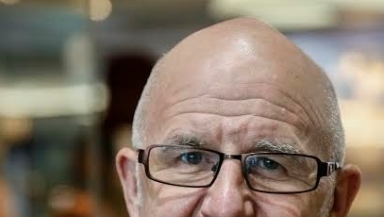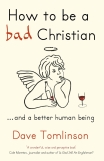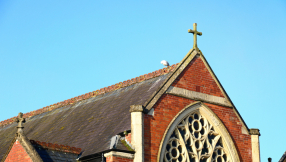
Rev Dave Tomlinson is a controversial figure both inside and outside of church circles. Last year he found himself dubbed 'The Villain's Vicar' by the national press after taking the funeral of train robber Ronnie Biggs.
As well as being the parish priest of St Luke's in Holloway, London, Tomlinson is the author of The Post-Evangelical and Re-enchanting Christianity which both provoked fierce debate within the church community.
His latest book The Bad Christian's Manifesto is a follow-up to last year's How to Be a Bad Christian (and a Better Human Being).
Sarah Lothian finds out more...
Who or what is a bad Christian?
I think it's one of those phrases that once you throw it out there people interpret it in different ways. It was inspired by Simon Barnes' wonderful book, How To Be A Bad Birdwatcher in which he's trying to take birdwatching as an activity out of the hands of twitchers and geeks and people with expensive binoculars and say that birds belong to everybody. Look out the window, see a bird, enjoy, congratulations you're a bad birdwatcher.
As soon as I read that I thought this is actually what I think about God. I think that God doesn't just belong to the religious, the believers, that God is part of everyone's life, so it was a way of including people that may otherwise not see themselves as being included.
That said, it's resonated with an awful lot of people who are believers, who are church-going people who feel that they're a bit rubbish in some ways or who don't quite fit in.
So I think that it's a phrase thrown out there that people will interpret in different ways.
Who are the Bad Christian books aimed at?
I wrote them for people who are outside the church ghetto, outside of mainstream religion.
I've written several books before these which have all been directed at people on the fringes - people who are on the inside but struggling to hang on and struggling to make sense of their faith.
So I suppose what I'm doing now is pitching it a bit beyond that and going outside, realising that an awful lot of people who would identify themselves as Christians will certainly identify with it too. But my intention really is much more to reach out to the people beyond the church – that great hoard of people who have been recognised as spiritual but not religious, but who perhaps feel that there is more to life than the day to day mundane stuff; they are reaching for something more, they may be more particularly on a spiritual search but they don't for one minute think that church, Christianity or religion is a way forward for them.
You've mentioned people on a spiritual search, in the book you talk about spiritual intelligence, could you expand on that?
For most of the 20<sup>th century intelligence was identified just with cognitive powers with rational capabilities and then in the mid 80s suddenly there was this realisation that there are multiple intelligences.
Howard Gardner wrote about that, and then Daniel Goleman in the mid-90s wrote about emotional intelligence in particular as another form of intelligence, and then towards the end of the 90s there were more and more people who were recognising that there's also a spiritual intelligence.
Emotional intelligence is to do with how we process emotions and emotional interactions with other people and I think spiritual intelligence is about that capacity of the human brain to process questions of meaning.
There's quite a lot of work from a neuro-scientific point of view that show there are certain parts of the brain or combinations of parts of the brain that light up when people are engaged in issues of spirituality – be that prayer or meditation, not of one particular tradition but of any and beyond religious tradition.
So I think it's saying that we all have a capacity to develop a sense of meaning in life. Some people have developed that more than others and I don't think that has anything to do with whether someone is religious or not.
Looking back over my experience of the church over many, many years I think there are lots of people who would identify themselves as Christians, as well as members of other religious communities, who actually are not very spiritually intelligent whereas there are people who may see themselves as atheist or agnostic, not religious who I think have got a great sense of spiritual intelligence.
How have your books been received by the more traditional or evangelical wing of the church?
I think that people who would see themselves as being traditional, conservative evangelicals, are unlikely to like what I'm saying very much. I've just done an interview with Premier Radio – I think some of the responses to that would bear this out really, I was called a heretic by one man who phoned in.
I think the interesting thing is that all these categories are moving around within and under the umbrella of evangelicalism there's huge diversity and nothing is quite as fixed as it used to be.
I find I get an incredible amount of response, emails and messages from people who are in the evangelical church who are saying 'wow, at last someone's saying this – this is what I've thought for a long time'.
I think, rather as I did back in the 90s with The Post Evangelical which had a very similar response, you can look at something like the evangelical church on the surface and think it all looks fairly monotone, and everyone has the same sort of view, but in fact that's not true and people are all on different journeys of thinking and re-organising the things that they believe.
So there are lots of people from the evangelical sector of the church who say they find the ideas that I've put forward to be liberating and very affirming.
How would you react to someone from an evangelical background who might say your ideas make Christianity appear 'acceptable' and easy... when it's not.
One level it is. One the other hand I don't think it's easy at all. Following the things that Jesus taught, living the way Jesus taught us to live is a long way from easy.
There are great challenges to following Jesus, challenges about our lifestyle and the way we treat other people, it's a very challenging way to follow the path of Jesus.
But I think in terms of what people may consider to be some kind of absolute truth what I'm doing is highlighting a reality that is emerging, which is that the world is not as black and white as people have thought that it is, and truth is not black and white.
So I think it's not about unsettling people, it's about affirming what an awful lot of people are already thinking and already seeing. There's an almost fearful reaction I think from conservative evangelicals who want to hold it all together and who want to maintain this sort of myth that truth is a simple straightforward thing. It's actually far more complicated than that, I think.
I'm not at all trying to just make the Christian way to be more 'easy'. I think I'm trying to make it more accessible but people still make choices in life and I think if we look out at our world there's an awful lot of people who are making wrong choices. I make wrong choices sometimes.
When people came to Jesus asking about eternal life or wanting to know what he was talking about he repeatedly took them back to issues of personal lifestyle, about keeping the Commandments for instance, or telling people to give their goods to feed the poor and question the values that they're living by. These are hard challenges that we all have to face in the world.
My point would be that there are a lot of people who never come near a church who are making better choices in their lives and for the world than lots of us who call ourselves Christians.
At your book launch you said you were angry at some of the things that have been said and done in the name of Christ...
I think that I can come across as being mild and compassionate, which I hope I am, but actually underneath of that is a deep sense of frustration and anger that the God that I believe in so passionately, that I see embodied in Jesus Christ so wonderfully and perfectly, is mis-conveyed again and again to the hurt and damage of people.
When, for instance I see people being treated as outsiders – good people, God-fearing people of other faith traditions for instance – being told that they are going to hell or whatever; same sex couples who love each other as I've said in the book with all the passion and commitment that I feel towards my wife, being treated as second class citizens... When it was announced that [these] people would be allowed to get married in churches now but not in the Church of England that made me very angry, because I know of people who have been training for priesthood who feel they have to leave the church now. The pastoral fall-out of treating some people as second-class and sub-standard is absolutely dire and it makes me very angry.
The Bad Christian's Manifesto Reinventing God (and other modest proposals) is published by Hodder & Stoughton.














